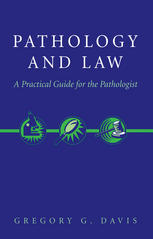

Most ebook files are in PDF format, so you can easily read them using various software such as Foxit Reader or directly on the Google Chrome browser.
Some ebook files are released by publishers in other formats such as .awz, .mobi, .epub, .fb2, etc. You may need to install specific software to read these formats on mobile/PC, such as Calibre.
Please read the tutorial at this link: https://ebookbell.com/faq
We offer FREE conversion to the popular formats you request; however, this may take some time. Therefore, right after payment, please email us, and we will try to provide the service as quickly as possible.
For some exceptional file formats or broken links (if any), please refrain from opening any disputes. Instead, email us first, and we will try to assist within a maximum of 6 hours.
EbookBell Team

0.0
0 reviewsAlmost all pathologists face legal issues when dealing with the specimens they work with on a day-to-day basis, whether it involves quality control and assurance in handling the specimens, facing the possibility of malpractice suits, or serving as an expert witness in a trial.
Written in an easy to read, conversational tone, with a dose of good humor, this book fills the need for a handbook that discusses the full spectrum of legal issues that many pathologists face, written from a pathologist's point of view. Organized in 12 user-friendly chapters, the book begins with a comparison of Law and Medicine and explains the basics of the American Legal System. It continues with discussions of the impact of law on the practice of pathology, including such topics as specimens with potential legal implications, the controversy of saving organs for teaching, procuring and saving specimens for toxicology testing and DNA confirmation in identity testing. A must-have section on malpractice suits covers reasons why patients sue, what to do if sued, and reducing the chance of being sued. The author addresses expert witness testimony, including how to be an expert witness, conflicts of interest, conduct in a courtroom, what to say and what not to say. Quality control and assurance as it applies to the pathologist is also discussed. Legal implications for the information age, including the use of internet and e-mail with regard to patient confidentiality is discussed in detail. Case samples are scattered throughout the text to illustrate the principles discussed. Every term is defined in the glossary.